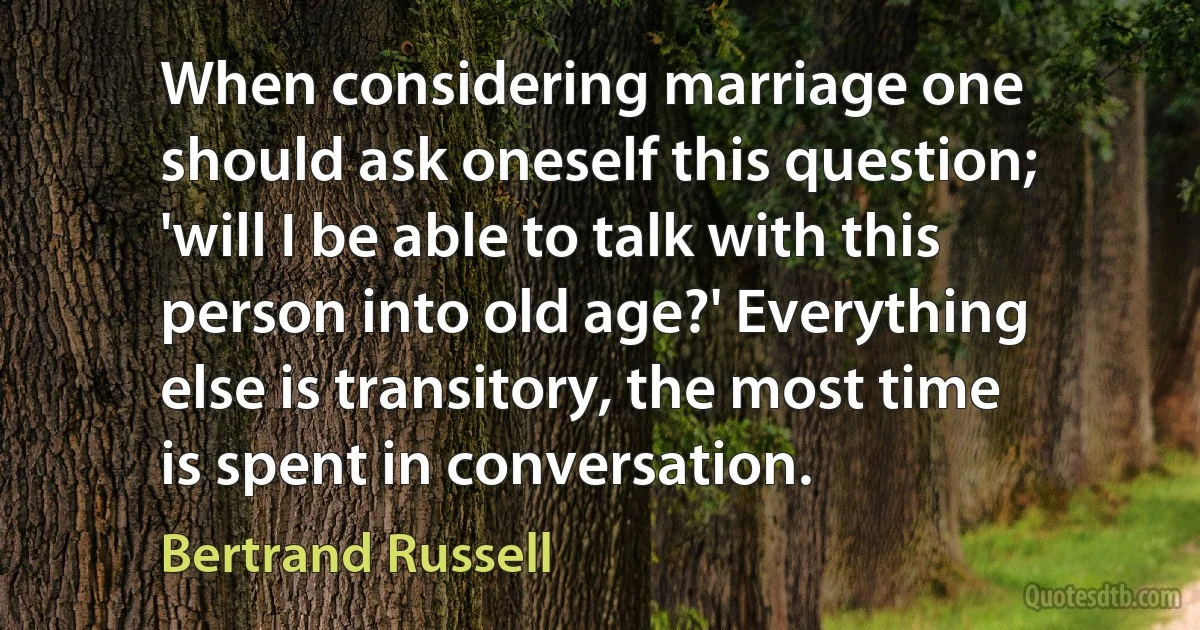Considering Quotes - page 6
In some quarters the films and books are lauded for their wholesome message, which is weird considering Bella is essentially deciding whether she'd rather shag a bat or a wolf. She's got zero interest in honest-to-goodness human-on-human action. No. It's magic farmyard creatures or nothing for her.

Charlie Brooker
There is no doubt that this kingdom is one that the children of God's direct lineage can reign over by upholding the heavenly decree. In other words, it is a nation in which they rule on behalf of God's commands and kingship. Democracy and communism cannot exist in such a kingdom. Once established, it will remain as an eternal state system. Considering these things, isn't it mortifying that you have not yet become the citizens of that kingdom?

Sun Myung Moon
The most blatant illustration of this statement is the fact that in 1972, Larry Roberts, the director of IPTO, sought to privatize ARPANET, once it was up and running. He offered to transfer operational responsibility to ATT. After considering the proposal, with the help of a committee of experts from Bell Laboratories, the company refused.

Manuel Castells
The change toward larger Gestalten and the necessity of this change for both humanistic and formal reasons can be illustrated by considering Sullivan's emphasis upon the phenomena of interaction. This emphasis is very clearly part of a defense of man against the older, more mechanistic thinking which saw him so heavily determined by his internal psychological structure that he could easily be manipulated by pressing the appropriate buttons - a doctrine which made the therapeutic interview into a one-way process with the patient in a relatively passive role. The Sullivanian doctrine places the therapeutic interview on a human level, defining it as a significant meeting between two human beings. The role of the therapist is no longer to be dehumanized in terms of definable purposes which he can plan, and the role of the patient is no longer dehumanized into that of an object of manipulation.

Gregory Bateson
If you want to get an idea of a friend's temperament, ethics, and personal elegance, you need to look at him under the tests of severe circumstances, not under the regular rosy glow of daily life. Can you assess the danger a criminal poses by examining only what he does on an ordinary day? Can we understand health without considering wild diseases and epidemics? Indeed the normal is often irrelevant.

Nassim Nicholas Taleb
The great majority of men and women, in ordinary times, pass through life without ever contemplating or criticising, as a whole, either their own conditions or those of the world at large. They find themselves born into a certain place in society, and they accept what each day brings forth, without any effort of thought beyond what the immediate present requires. Almost as instinctively as the beasts of the field, they seek the satisfaction of the needs of the moment, without much forethought, and without considering that by sufficient effort the whole conditions of their lives could be changed.

Bertrand Russell
An atheist, like a Christian, holds that we can know whether or not there is a God. The Christian holds that we can know there is a God; the atheist, that we can know there is not. The Agnostic suspends judgment, saying that there are not sufficient grounds either for affirmation or for denial. At the same time, an Agnostic may hold that the existence of God, though not impossible, is very improbable; he may even hold it so improbable that it is not worth considering in practice. In that case, he is not far removed from atheism. His attitude may be that which a careful philosopher would have towards the gods of ancient Greece. If I were asked to prove that Zeus and Poseidon and Hera and the rest of the Olympians do not exist, I should be at a loss to find conclusive arguments. An Agnostic may think the Christian God as improbable as the Olympians; in that case, he is, for practical purposes, at one with the atheists.

Bertrand Russell
When in 1909 our battlefleet returned from its voyage around the world, Admirals Wainwright and Schroeder represented the best traditions and the most effective action in our navy; one was of old American blood and of English descent; the other was the son of German immigrants. But one was not a native-American and the other a German-American. Each was an American pure and simple. Each bore allegiance only to the flag of the United States. Each would have been incapable of considering the interests of Germany or of England or of any other country except the United States.

Theodore Roosevelt
A religious college in Cairo is considering issues of nanotechnology: If replicators are used to prepare a copy of a strip of bacon, right down to the molecular level, but without it ever being part of a pig, how is it to be treated? (If the mind of one of the faithful is copied into a computing machine's memory by mapping and simulating all its synapses, is the computer now a Moslem? If not, why not? If so, what are its rights and duties?)

Charles Stross
I am heartily tired of this life of bondage, responsibility, and toil. I wish it was at an end.... We are both physically very healthy.... Our tempers are cheerful. We are social and popular. But it is one of our greatest comforts that the pledge not to take a second term relieves us from considering it. That was a lucky thing. It is a reform - or rather a precedent for a reform, which will be valuable.

Rutherford B. Hayes
It is urged in the first place that contempts cannot be crimes, because, although punishable by imprisonment, and therefore, if crimes, infamous, they are not within the protection of the Constitution and the Amendments giving a right to trial by jury, etc., to persons charged with such crimes. But the provisions of the Constitution are not mathematical formulas having their essence in their form; they are organic, living institutions transplanted from English soil. Their significance is vital, not formal; it is to be gathered not simply by taking the words and a dictionary, but by considering their origin and the line of their growth.

Oliver Wendell Holmes Jr.
This mysterious something has been called God, the Absolute, Nature, Substance, Energy, Space, Ether, Mind, Being, the Void, the Infinite-names and ideas which shift in popularity and respectabilitywith the winds of intellectual fashion, of considering the universe intelligent or stupid, superhuman or subhuman, specific or vague. All of them might be dismissed as nonsense-noises if the notion of an underlying Ground of Being were no more than a product of intellectual speculation. But these names are often used to designate the content of a vivid and almost sensorily concrete experience-the "unitive" experience of the mystic, which, with secondary variations, is found in almost all cultures at all times. This experience is the transformed sense of self which I was discussing in the previous chapter, though in "naturalistic" terms, purified of all hocus-pocus about mind, soul, spirit, and other intellectually gaseous words.

Alan Watts
By the approach through abnormality we have succeeded in penetrating most deeply into the darkness of human nature ... The literary person should be the last person to be surprised at this fact. Sooner might he be surprised that he, considering his strong generally and individual tendency, should have so late become aware of the close sympathetic relations which connected his own existence with psychoanalytic research and the life-work of Sigmund Freud. I realized this connection only at a time when his achievement was no longer thought of as merely a therapeutic method, whether recognized or disputed; when it had long since outgrown his purely medical implications and become a world movement which penetrated into every field of science and every domain of the intellect: literature, the history of art, religion and prehistory; mythology, folklore, pedagogy, and what not.

Thomas Mann
After reading and considering the works of Babhravya and other ancient authors, and thinking over the meaning of the rules given by them, this treatise [Kama Sutra] was composed, according to the precepts of the Holy Writ, for the benefit of the world,... while leading the life of a religious student at Benares, and wholly engaged in the contemplation of the Deity. This work is not to be used merely as an instrument for satisfying our desires...

Vātsyāyana



